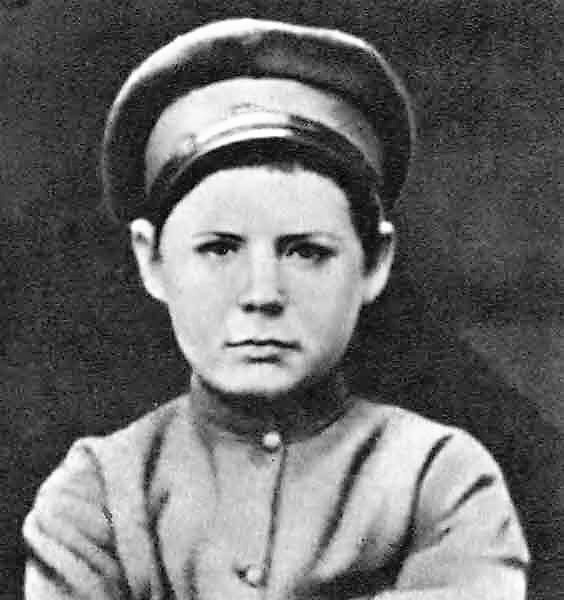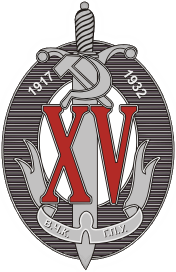|
Alexander Slepkov
Alexander Nikolaevich Slepkov (Russian: Александр Николаевич Слепков; 20 August 1899 – 26 May 1937) was a Soviet journalist and Communist Party functionary, executed for his opposition to the forced collectivization of agriculture. Early career Alexander Slepkov was born in Ryazan province, in Russia, one of six children. His father, Nikolai, was a peasant's son, who completed high school and became a teacher, and later a beekeeper. In his teens, he may have been a supporter of the Kadets, a liberal pro-monarchist party, before he, and his father, joined the All-Russian Communist Party (Bolsheviks) in the town of Ludza, in Latvia, where Nikolai was elected the town's first Commissar for Education, and Alexander was elected the first Commissar for Justice. When the German army occupied Latvia, both were arrested and sentenced to death, but they were released by local population when the Germans withdrew. Alexander Slepkov graduated from Sverdlov Uni ... [...More Info...] [...Related Items...] OR: [Wikipedia] [Google] [Baidu] |
Left Opposition
The Left Opposition was a faction within the Russian Communist Party (b) from 1923 to 1927 headed ''de facto'' by Leon Trotsky. The Left Opposition formed as part of the power struggle within the party leadership that began with the Soviet founder Vladimir Lenin's illness and intensified with his death in January 1924. Originally, the battle lines were drawn between Trotsky and his supporters who signed The Declaration of 46 in October 1923 on the one hand and a triumvirate (also known by its Russian name ''troika'') of Comintern chairman Grigory Zinoviev, Communist Party General Secretary Joseph Stalin and Politburo chairman Lev Kamenev on the other hand. The Left Opposition argued that the New Economic Policy had weakened the Soviet Union by allowing the private sector to achieve an increasingly important position in the Soviet economy while in their opinion, the centrally planned, socialised sector of the economy languished (including the mostly state-run heavy industries w ... [...More Info...] [...Related Items...] OR: [Wikipedia] [Google] [Baidu] |
Kuban
Kuban (Russian and Ukrainian: Кубань; ady, Пшызэ) is a historical and geographical region of Southern Russia surrounding the Kuban River, on the Black Sea between the Don Steppe, the Volga Delta and the Caucasus, and separated from the Crimean Peninsula to the west by the Kerch Strait. Krasnodar Krai is often referred to as ''Kuban'', both officially and unofficially, although the term is not exclusive to the krai and accommodates the republics of Adygea, Karachay-Cherkessia, and parts of Stavropol Krai. Cossack settlement The Cossack settlement of Kuban and of the adjacent Black Sea region occurred gradually for over a century, and was heavily influenced by the outcomes of the conflicts between Russia and Ottoman Empire.Azarenkova et al., pp. 8ff. In the mid-18th century, the area was predominantly settled by the mountainous Adyghe tribes. After the Russo-Turkish War of 1768–1774, the population of the area started to show more pro-Russian tendencies. ... [...More Info...] [...Related Items...] OR: [Wikipedia] [Google] [Baidu] |
Moscow Trials
The Moscow trials were a series of show trials held by the Soviet Union between 1936 and 1938 at the instigation of Joseph Stalin. They were nominally directed against " Trotskyists" and members of " Right Opposition" of the Communist Party of the Soviet Union. At the time the three Moscow trials were given extravagant titles: # the "Case of the Trotskyite-Zinovievite Terrorist Center" (or Zinoviev- Kamenev Trial, also known as the 'Trial of the Sixteen', August 1936); # the "Case of the Anti-Soviet Trotskyist Center" (or Pyatakov- Radek Trial, also known as the 'Trial of the Seventeen', January 1937); and # the " Case of the Anti-Soviet "Bloc of Rights and Trotskyites"" (or the Bukharin- Rykov Trial, also known as the 'Trial of the Twenty-One', March 1938). The defendants were Old Bolshevik Party leaders and top officials of the Soviet secret police. Most were charged under Article 58 of the RSFSR Penal Code with conspiring with Imperialist powers to assassinate Sta ... [...More Info...] [...Related Items...] OR: [Wikipedia] [Google] [Baidu] |
Sergei Kirov
Sergei Mironovich Kirov ( né Kostrikov; 27 March 1886 – 1 December 1934) was a Soviet politician and Bolshevik revolutionary whose assassination led to the first Great Purge. Kirov was an early revolutionary in the Russian Empire and member of the Bolshevik faction of the Russian Social Democratic Labour Party. Kirov became an Old Bolshevik and personal friend to Joseph Stalin, rising through the Communist Party of the Soviet Union ranks to become head of the party in Leningrad and a member of the Politburo. On 1 December 1934, Kirov was shot and killed by Leonid Nikolaev at his offices in the Smolny Institute for unknown reasons; Nikolaev and several suspected accomplices were convicted in a show trial and executed less than 30 days later. Kirov's death was later used as a pretext for Stalin's escalation of political repression in the Soviet Union and the events of the Great Purge, with complicity as a common charge for the condemned in the Moscow Trials. Kirov's a ... [...More Info...] [...Related Items...] OR: [Wikipedia] [Google] [Baidu] |
Chelyabinsk Oblast
Chelyabinsk Oblast (russian: Челя́бинская о́бласть, ''Chelyabinskaya oblast'') is a federal subject (an oblast) of Russia in the Ural Mountains region, on the border of Europe and Asia. Its administrative center is the city of Chelyabinsk. Its population is 3,476,217. ( 2010 Census). History During the Middle Ages, Bashkir tribes inhabited the Southern Urals; they formed part of the Golden Horde, Nogai Horde, and smaller Bashkir unions. The Tsardom of Russia incorporated the area in the late 16th century. However, Russian colonization of the region only began in the 18th century, with the establishment of a system of fortresses and trade posts on the then-Russian border by the in 1734. Many cities of Chelyabinsk Oblast, including the city of Chelyabinsk itself, trace their history back to those forts. In 1743 the Chelyabinsk fortress became a center of the , a constituent part of the Orenburg Governorate (a direct successor of the Orenburg E ... [...More Info...] [...Related Items...] OR: [Wikipedia] [Google] [Baidu] |
Verkhneuralsk
Verkhneuralsk (russian: Верхнеура́льск) is a town and the administrative center of Verkhneuralsky District in Chelyabinsk Oblast, Russia, located in the upper streams of the Ural River, southwest of Chelyabinsk, the administrative center of the oblast. Population: History Founded in 1734 as the fortress of Verkhneyaitskaya (), it was renamed Verkhneuralskaya () after the Yaik River was renamed the Ural. Town status was granted to it in 1781. Administrative and municipal status Within the framework of administrative divisions, Verkhneuralsk serves as the administrative center of Verkhneuralsky District.Resolution #161 As an administrative division, it is incorporated within Verkhneuralsky District as the Town A town is a human settlement. Towns are generally larger than villages and smaller than city, cities, though the criteria to distinguish between them vary considerably in different parts of the world. Origin and use The word "town" shares ... of ... [...More Info...] [...Related Items...] OR: [Wikipedia] [Google] [Baidu] |
Tara, Omsk Oblast
Tara (russian: Та́ра) is a town in Omsk Oblast, Russia, located at the confluence of the Tara and Irtysh Rivers at a point where the forested country merges into the steppe, about north of Omsk, the administrative center of the oblast. Population: History It was founded as a fort around 1594 as a direct result of Yermak's incursions into Siberia, and as such is one of the oldest towns in the region. Tara pre-dates many of Siberia's larger cities and for many years served as a gateway for further eastward settlement. Omsk, which subsequently eclipsed Tara in importance, was founded at the request of Tara's military commanders. Tara's historical churches recall a time when it was one of only two cities in Tobolsk Eparchy and Tara served as the first administrative division of the Russian Orthodox Church in Siberia. In the 18th–19th centuries, Tara was also the seat of Tarsky Uyezd of Tobolsk Governorate, with jurisdiction over Omsk. Its early prominence notwithstan ... [...More Info...] [...Related Items...] OR: [Wikipedia] [Google] [Baidu] |
OGPU
The Joint State Political Directorate (OGPU; russian: Объединённое государственное политическое управление) was the intelligence and state security service and secret police of the Soviet Union from 1923 to 1934. The OGPU was formed from the State Political Directorate of the Russian Soviet Federative Socialist Republic one year after the founding of the Soviet Union and responsible to the Council of People's Commissars. The agency operated inside and outside the Soviet Union, persecuting political criminals and opponents of the Bolsheviks such as White émigrés, Soviet dissidents, and anti-communists. The OGPU was based in the Lubyanka Building in Moscow and headed by Felix Dzerzhinsky until his death in 1926 and then Vyacheslav Menzhinsky until it was reincorporated as the Main Directorate of State Security (GUGB) of the NKVD in 1934. History Founding Following the formation of the Soviet Union in December 1922, t ... [...More Info...] [...Related Items...] OR: [Wikipedia] [Google] [Baidu] |
Martemyan Ryutin
Martemyan Nikitich Ryutin ( rus, Мартемья́н Ники́тич Рю́тин, Martem'yán Nikítich Ryútin; 13 February, 1890 – 10 January, 1937) was a Russian Marxist activist, Bolshevik revolutionary, and a political functionary of the Russian Communist Party. Ryutin is best remembered as the leader of a pro-peasant political faction organized against Soviet leader Joseph Stalin in the early 1930s and as the primary author of a 200-page oppositional platform. Ryutin was arrested by the Soviet secret police, along with his co-thinkers, in what has come to be known as the Ryutin Affair. He was executed in January 1937 as part of the "Yezhovshchina" (Great Purge) conducted against political oppositionists and suspected economic " wreckers" and spies. During the final years of the Soviet Union, Ryutin was politically rehabilitated, and his lengthy critique of Stalin and his policies was published for the first time. The document saw its first edition in English translati ... [...More Info...] [...Related Items...] OR: [Wikipedia] [Google] [Baidu] |
Rostov-on-Don
Rostov-on-Don ( rus, Ростов-на-Дону, r=Rostov-na-Donu, p=rɐˈstof nə dɐˈnu) is a port city and the administrative centre of Rostov Oblast and the Southern Federal District of Russia. It lies in the southeastern part of the East European Plain on the Don River, from the Sea of Azov, directly north of the North Caucasus. The southwestern suburbs of the city lie above the Don river delta. Rostov-on-Don has a population of over one million people, and is an important cultural centre of Southern Russia. History Early history From ancient times, the area around the mouth of the Don River has held cultural and commercial importance. Ancient indigenous inhabitants included the Scythian and Sarmatian tribes. It was the site of Tanais, an ancient Greek colony, Fort Tana under the Genoese, and Fort Azak in the time of the Ottoman Empire. In 1749, a custom house was established on the Temernik River, a tributary of the Don, by edict of the Empress Elizabeth, the ... [...More Info...] [...Related Items...] OR: [Wikipedia] [Google] [Baidu] |
Samara
Samara ( rus, Сама́ра, p=sɐˈmarə), known from 1935 to 1991 as Kuybyshev (; ), is the largest city and administrative centre of Samara Oblast. The city is located at the confluence of the Volga and the Samara rivers, with a population of over 1.14 million residents, up to 1.22 million residents in the urban agglomeration, not including Novokuybyshevsk, which is not conurbated. The city covers an area of , and is the eighth-largest city in Russia and tenth agglomeration, the third-most populous city on the Volga, as well as the Volga Federal District. Formerly a closed city, Samara is now a large and important social, political, economic, industrial, and cultural centre in Russia and hosted the European Union—Russia Summit in May 2007. It has a continental climate characterised by hot summers and cold winters. The life of Samara's citizens has always been intrinsically linked to the Volga River, which has not only served as the main commercial thoroughfare of Rus ... [...More Info...] [...Related Items...] OR: [Wikipedia] [Google] [Baidu] |






2.jpg)
